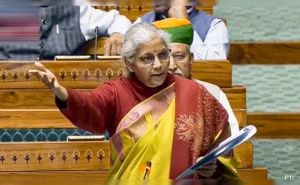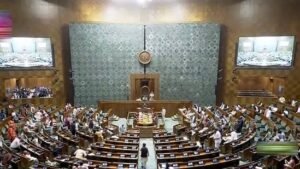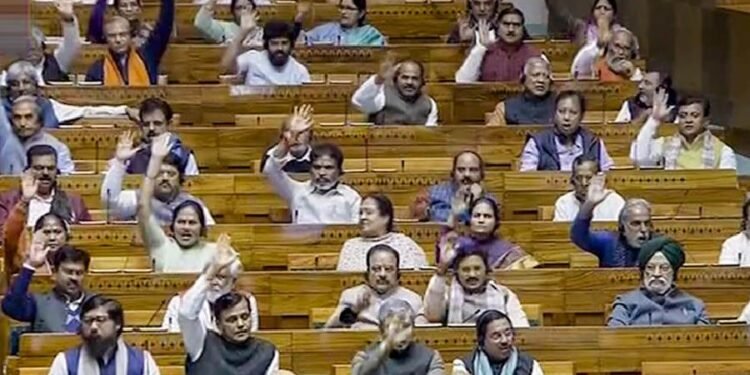Lok Sabha Passes Two tax- Related Bill
The Lok Sabha’s recent passage of two significant indirect tax-related bills marks a pivotal moment in India’s fiscal landscape. The Central Goods and Services Tax (Second Amendment) Bill, 2023, and the Provisional Collection of Taxes Bill, 2023, bring about crucial changes, impacting the age limits for key appointments and the immediate implementation of customs and excise duty adjustments outlined in the Budget.
Central Goods and Services Tax (2nd Amendment) Bill:
The primary focus of this bill is to align the provisions of the Central Goods and Services Tax Act, 2017, with the Tribunal Reforms Act of 2021. This alignment aims to streamline the administrative processes for the operationalization of the Goods and Services Tax Appellate Tribunals (GSTAT) promptly.
1. Age Limit Revisions:
The most notable aspect of this amendment is the adjustment of the age limits for the President and Members of the GST Appellate Tribunal. Previously set at 67 years for the president and 65 years for members, the new amendment extends these limits to 70 years for the president and 67 years for judicial and technical members. This change is a crucial step in ensuring experienced individuals can contribute their expertise for an extended period, enhancing the effectiveness of the tribunal.
2. Eligibility Criteria for Judicial Members:
Another noteworthy change is the eligibility criteria for judicial members. An advocate with a decade of substantial experience in litigating matters related to indirect taxes in the Appellate Tribunal is now eligible to be appointed as a judicial member of GSTAT. This move emphasizes the importance of experience in handling complex tax-related cases, ensuring that those appointed possess a deep understanding of the legal intricacies involved.
3. Term Duration:
The amendment specifies that the President and members of GSTAT will hold office for four years or until reaching the age limit, whichever comes earlier. This provides stability in the leadership of the tribunal, allowing for consistent application of tax jurisprudence.
4. Facilitating Taxpayer Transition:
Finance Minister Nirmala Sitharaman highlighted a crucial aspect of the amendment – it provides taxpayers litigating against GST demands in various High Courts or the Supreme Court with the liberty to withdraw their cases and approach GSTAT once the benches start functioning. This move aims to expedite the resolution of tax disputes and streamline the judicial process.
Provisional Collection of Taxes Bill, 2023:
This bill holds significance in facilitating the immediate implementation of changes in customs and excise duties announced in the Budget. It replaces the Provisional Collection of Taxes Act of 1931 with a minor technical change, providing the government with the authority to provisionally levy and collect newly imposed duties for a period of 75 days.
1. Immediate Effect Mechanism:
One of the key features of the Provisional Collection of Taxes Bill, 2023, is its ability to grant immediate effect to the changes in customs and excise duties. While changes in income and corporate tax rates typically take effect from April 1 or a notified date, customs and excise duty rate adjustments are effective from midnight. The new bill ensures the “immediate effect for a limited period” of the provisions related to the imposition or increase of customs/excise duties.
2. Temporary Measures to Prevent Speculative Activities:
Finance Minister Sitharaman emphasized that invoking this bill allows the government to temporarily ensure that no speculative activities occur during the period between the introduction and enactment of increased customs or central excise duties. This temporary provision aims to maintain fiscal stability and prevent undue market fluctuations.
3. Replacing the 1931 Act:
The move to replace the Provisional Collection of Taxes Act of 1931 with a minor technical change demonstrates the government’s commitment to modernizing and adapting to the evolving fiscal landscape. The new bill incorporates existing provisions while addressing contemporary challenges in tax administration.
Implications:
The passage of the Central Goods and Services Tax (Second Amendment) Bill, 2023, and the Provisional Collection of Taxes Bill, 2023, reflects the government’s commitment to fostering a robust and adaptive tax framework. The changes in age limits for GSTAT appointments signify a strategic move to retain experienced individuals in key positions, while the Provisional Collection of Taxes Bill provides a necessary mechanism for the immediate implementation of customs and excise duty adjustments. These legislative steps are poised to have a far-reaching impact on India’s indirect tax structure, promoting efficiency, transparency, and timely resolution of tax disputes.











Comments 1